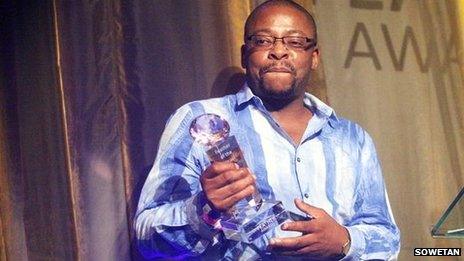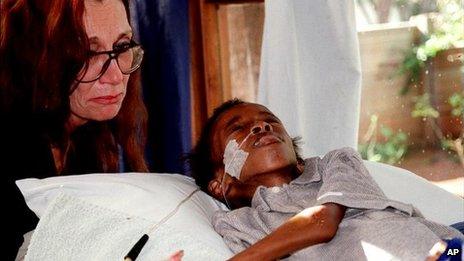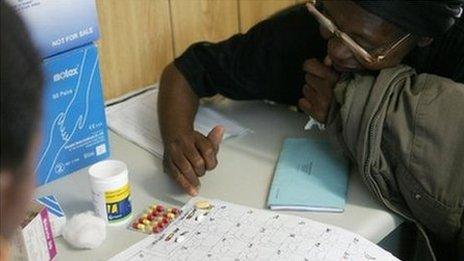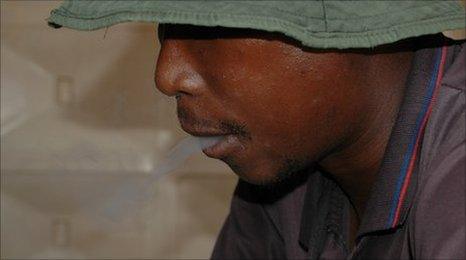Lucky Mazibuko: Bitter sweet victory for Aids patients
- Published

Lucky Mazibuko has received a number of awards for his campaigns
For 16 years South Africa's Lucky Mazibuko, an Aids activist and columnist, did not take Aids drugs in protest against former President Thabo Mbeki's government's refusal to make drugs available for Aids patients. He speaks to the BBC's Pumza Fihlani about his journey with HIV. He finally started taking the drugs four years ago.
I've been living with HIV for 20 years now, it has not been easy - it has been a tough road.
I've been on an oxygen mask three times because of my personal protests when the former President Mbeki did not want to provide treatment to children and also people living with HIV.
I could not live as though nothing was happening, the motivation for my activism has always been that people have a right to life and I always felt guilty living healthy while watching my fellow countrymen dying.
There was a time when 600 people were dying every day in South Africa because of the disease and I could not simply be selfish and not want to get involved and help. Thankfully time has changed.
New era for Aids sufferers?
It is a privilege for me to see the fruits of my and many other people's sacrifice in my lifetime.
Millions of children are being saved on a daily basis, children are being born free of HIV because of the treatment available for children.
People living with HIV are receiving ARVs easily now even though the numbers are not sufficient - but it is a most welcome change.
I think with the new government there was a shift in mindset; the new thinking has served well for us people with HIV.
It is still a challenge, though, getting men to go for tests - mostly women are the ones going for the tests.
If I said we are living in an ideal world where there is no stigma against Aids, I would be lying and that would be disingenuous.
I think the stigma still exists even among those who test positively for HIV.
They stigmatise themselves because they automatically assume they will be discriminated against - the danger of that is that once someone feels that way they resign themselves to death, they become desperate and they infect other people.
The biggest challenge we now have as South Africans is to personalise HIV, to see it not as something removed from us but as something personal - this will make the struggle make sense to each of us.
While the stigma attached by society has subsided, we now need to deal with the personal stigma and personal ramifications of living with HIV.
Joy and pain

Young activist, Nkosi Johnson (R) was one of millions of children to die of Aids in South Africa
My personal journey has always been very painful - living with HIV is no picnic at all, it is far from that.
For me the greatest pain has been seeing children die on a daily basis, like Nkosi Johnson - who was my youngest friend and Phephile Hlabisa from KwaZulu Natal who was raped by her uncle because he believed sleeping with a child would cure him of HIV - she died when she was eight.
It has been from seeing healthy strong men and women succumb and fade away into the soil.
For me living with HIV, to this day always has a shadow of sadness, of loss, death and of dying.
But with that I've also witnessed great stories of human recovery and triumph, seeing the recovery of people who were on the verge of death claiming they've seen Jesus Christ's heels.
So its been a journey of joy and pain, a journey of inspiration and disempowerment.
Its been a painful journey generally, but personally I am happy that I am a living witness to where we are now.
My greatest inspiration has always been knowing that whatever sacrifice I've made over the past few years has been to save another person's life.
My greatest strength comes from laughter. The laughter and smile of a healthy child give me strength.
Every time I need my immune system to be boosted I always go to children's wards in hospitals and just spend time with them - the hospital officials have been very kind over the years because I almost have a free passport into those wards.
Every time I've come close to giving up, when I visit those kind of places, I'm reminded why I was at one time prepared to lay down my own life for those little ones.
- Published30 November 2011

- Published28 February 2011

- Published29 October 2010
- Published9 July 2024
